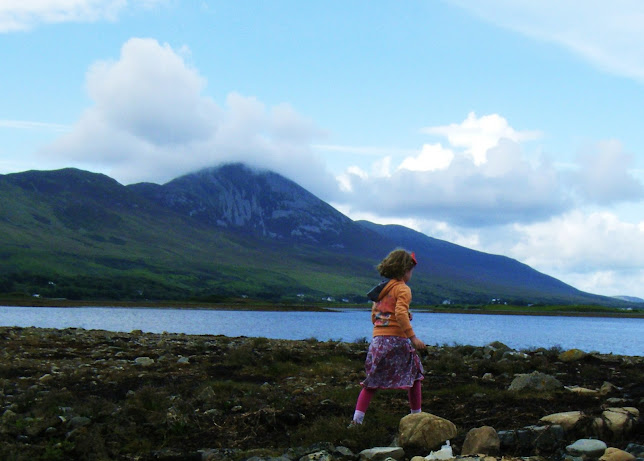More of what I'm writing lately:
If you ever wanted to see what the world might look like after a global Apocalypse, you could do worse than visit the Burren land on the Atlantic coast of Ireland. Most of my adopted country still looks as lush and green as in the tourist guides, but centuries of erosion washed away the Burren’s thin soil and carved jigsaw patterns into the limestone. Half of County Clare is a rippling moonscape of pale hills that stretches to the sea, with few trees to slow the screaming Atlantic winds.
Its stark beauty brings many tourists these days, who take photos of stone monuments older than the Pyramids -- but living here would seem to us like being marooned on an alien planet, and raising children unthinkable. It would not seem very thinkable now, in a house with heat and wi-fi; in the 1930s no one here had electricity or cars, no lights or radio, and people lived much the way they had in the 1830s, or for that matter the 1830s BC. Dersie Leonard, who grew up in the Burren then, later described how she and her childhood friends walked miles every day in all weather, barefoot and wearing clothes made from old flour sacks. Modern American kids, surrounded by toys and screens, would struggle to picture a more depressing existence.
Perhaps surprisingly, then, Leonard wrote joyfully about her early life, saying she and her friends had “lakes and rivers ... bog and rocks, not to mention fairy rings and forts – in fact everything a person could wish for.” They spent their days exploring, playing games, singing and telling stories, immersed in the feral joy of childhood, and she considered herself lucky to grow up as she had.
To many modern people, this sounds insane. Many Americans my age have never walked a day in their lives, much less barefoot, and a life without smart phones or cars, much less electricity or tap water, would seem like the most pitiable kind of misery, the condition you donate money to charities to lift people out of. Clearly all these people must be pranking us, or delusional about their own past.
To be sure, my Irish neighbours did grow up with a financial deprivation that most Americans can’t imagine. When we think of poverty, though, we think of inner cities or rural trailer parks, neighbourhoods of graffiti and boarded-up windows, rife with illiteracy, ignorance, addiction, abuse and violence. Irish families then made less than inner-city families today, so you’d assume they’d be even more miserable. In the two decades I’ve lived in rural Ireland, though, I’ve talked to dozens of people who grew up this way, read dozens of memoirs and diaries of day-to-day life from those days, and almost everyone says the same. Their childhood memories were not of sitting in the back seats of cars looking at screens, but of picking wildflowers and finding birds’ nests, climbing trees and looking under logs, swimming to islands or rowing boats, swearing eternal friendship, and engaging in the feral joy of a tribal childhood.

No comments:
Post a Comment